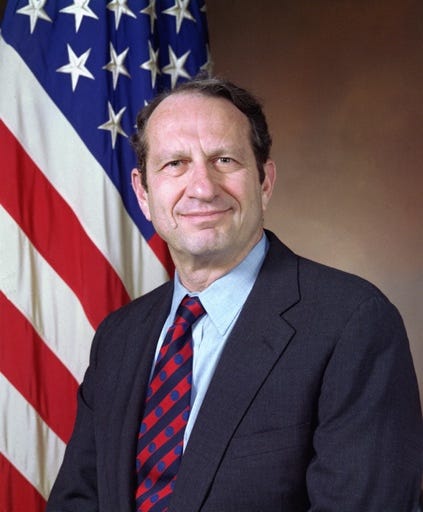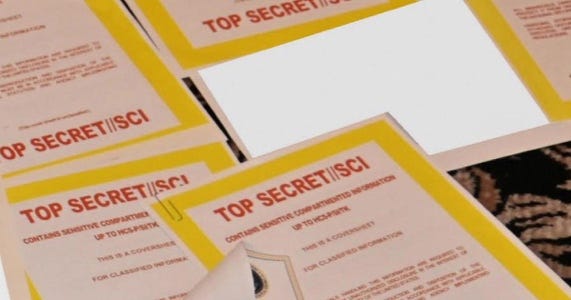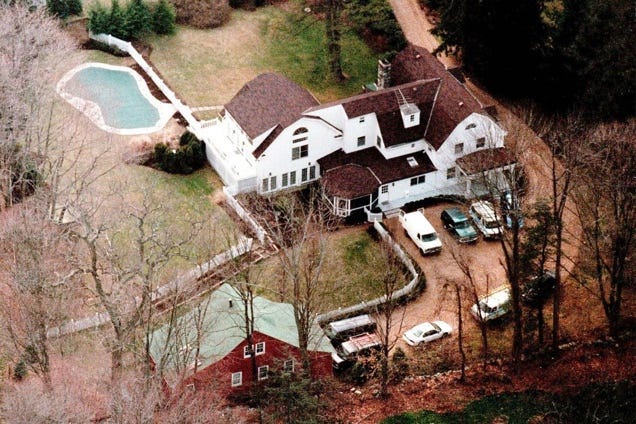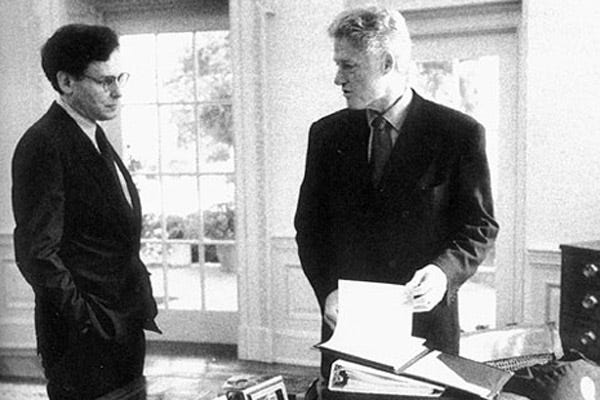Controversies have erupted over the discoveries of classified documents in the personal possession of Donald Trump and Joe Biden in unsecured locations. This isn’t the first time classified documents, including some containing the nation’s most sensitive secrets, were mishandled by high-level politicians. While low-ranking government employees and contractors could face severe penalties, including job loss and federal prosecution, US officials have been very forgiving when the offender is a well-known politician.
John Deutch served as the director of central intelligence for President Bill Clinton between May 1995 and December 1996. He began his tenure by launching a massive political correctness campaign aimed at fast-tracking the hiring and promotion of women and minorities as part of a strategic diversity plan.
John Deutch
However, the action he undertook to handcuff the ability of case officers — CIA employees that work clandestinely — to meet with bad actors on the world stage seriously undermined human intelligence collection efforts and had widespread repercussions, especially regarding the growing threat of terrorism.
CIA case officers and agents — foreigners in the employ of, or working with, US intelligence officers — must sometimes associate with undesirable elements if they are to gather valuable intelligence. However, Deutch thought they shouldn’t associate with these unsavory people.
After Deutch left the CIA, classified information was discovered on the government-owned laptop he was using at home. He stored large amounts of sensitive intelligence on the laptop designated for the storage of only unclassified information. Moreover, the laptop was connected to a modem, which made all of the information vulnerable to exploitation by hostile governments. As the former DCI, Deutch would have been a high priority target for exploitation by hostile governments, including Russia, China and North Korea, and terrorist organizations. Mishandling of classified information is a serious breach of security for persons working with such information.
Of all people, the former CIA director should have known better.
CIA security specialists immediately commenced an investigation of Deutch’s mishandling of the classified material. Upon conclusion of the eighteen-month investigation, the CIA’s Office of General Counsel, a Clinton political appointee, declined to refer the matter to the Department of Justice, as was standard protocol in such matters. The CIA also chose not to disclose the matter to the Intelligence Oversight Committees of the Congress or the Intelligence Oversight Board of the President’s Foreign Intelligence Advisory Board, as it should have.[i]
The CIA’s inspector general picked up the matter where the agency’s general counsel office left off, by opening a formal investigation in March 1998. Shortly thereafter, the inspector general’s office referred the matter to the DOJ.
A Justice Department investigation confirmed that Deutch knowingly mishandled classified information. Yet in April 1999, Attorney General Janet Reno declined to pursue criminal charges against him. Instead, she directed an investigation to determine the fitness of Deutch to retain his security clearances.
Simultaneously, the Defense Department launched its own investigation regarding Deutch’s handling of classified information while he served as under secretary of defense for acquisition and technology from April 1993 to March 1994, and as deputy secretary of defense from March 1994 to May 1995.
Forensic analysis of the information technology equipment Deutch used revealed he had 675 pages of text stored on unclassified computers and related media that “contain[ed] many entries that include[d] collaterally classified material and should, therefore, have been marked and treated as classified when written.”[ii] A further review found that an additional fourteen entries contained references to special access programs information that is classified at the absolute highest levels. A fifteenth entry also referred to a special access program when Deutch entered the information, but the entry was no longer classified when the review was conducted.
Sensitive Compartmented Information
Nearly another two years elapsed before Deutch finally admitted his guilt in improperly safeguarding classified material. He was negotiating a plea agreement with Justice Department officials when Bill Clinton preempted the entire matter by pardoning Deutch on January 20, 2001.
Hillary Clinton served as the secretary of state for President Barack Obama between January 2009 and January 2013. She began and ended her tenure by violating federal law and concealing her email communications from the State Department, Congress, the national archivist, and the public.
The steps she took to conduct government business on a privately owned computer server and email system was unprecedented. No other secretary of state or any other Cabinet official is known to have utilized a private server in their home to shield emails from congressional oversight, FOIAs and public accountability.
National Archives and Records Administration
Federal law requires every agency to retain records in any and all forms involved in the conduct of the business of government. Records under consideration for disposal must first be submitted to the national archivist for review and a determination before they may be destroyed.[iii] Claims that the State Department had unilateral authority to waive federal law are categorically false.
Despite federal law, Hillary Clinton had a private email server located in her Chappaqua, New York, home, which was used to conduct personal business, political business, campaign business, and government business. The unsecured server did not have necessary security protections to safeguard the system from penetration by hostile state and non-state actors. Officials of the National Archives and Records Administration called it a serious breach.
Clinton compound in Chappaqua, New York
There was no formal request of the State Department nor notification to the State Department that Clinton would be using the private server and email system to conduct the nation’s business. In fact, Clinton operated the server for the entire four years she served as secretary of state and neither notified the State Department, nor properly archived emails, as required by federal law.
The existence of Clinton’s private emails were only discovered when a hacker penetrated the private emails of longtime Clinton hatchet man Sidney Blumenthal.[iv] Clinton wanted to appoint Blumenthal to a State Department position; however, the Obama White House banned Blumenthal from having any role in the administration.[v] Blumenthal, known throughout Washington, DC as “Sid Vicious,” was an architect of the “birtherism” attacks against Barack Obama during the 2008 presidential race. Blumenthal was fueling rumors with journalists Obama was born in Kenya. He even visited the McClatchy News DC Bureau to encourage a reporter be dispatched to Kenya to investigate Obama’s alleged birthplace.[vi]
Sidney Blumenthal and Bill Clinton
Clinton’s aides claim she used a private email server only because the State Department had fuzzy guidelines on this matter. The State Department inspector general issued a report after an investigation into Clinton’s email practices and found nothing further from the truth. In fact, the State Department had very specific and detailed guidelines.
The inspector general found: “The Department’s current policy, implemented in 2005, is that normal day-to-day operations should be conducted on an authorized Automated Information System (AIS), which ‘has the proper level of security control to…ensure confidentiality, integrity, and availability of the resident information.’”[vii] Further, the IG found federal law enacted in 2002 “requires Federal agencies to ensure information security for the systems” used to perform government business.[viii]
Clinton falsely claimed former Secretary of State Colin Powell encouraged her to use a private email system. That claim was not true, according to Powell. He had explained he had used his personal AOL email account to address unclassified matters. This was only because the State Department did not have an unclassified email system when he assumed the office of Secretary of State. That would come years later. The State Department had only a classified system at the time.
Powell was displeased Clinton tried to use him as a defense in her use of an unsecured email server. He wrote a colleague, “I warned her (Clinton) staff three times over the past two years not to try to connect it to me.”[ix]
In late 2014, before the existence of Clinton’s secret email server became public knowledge, Clinton’s chief of staff decided which emails would be forwarded to the State Department for archiving. After this was completed, Clinton directed the destruction of at least thirty thousand emails that had not been properly reviewed or archived. This is a direct violation of 44 USC § 31. According to federal law, only the national archivist may determine which emails may be destroyed.
Hillary Clinton
Only days after the existence of Clinton’s private server became public in March 2015, the House Select Committee on Benghazi subpoenaed the emails on the server. Platte River Networks, the firm managing the server, had not destroyed the thirty thousand emails as Clinton had ordered months earlier. Despite the existence of a subpoena for the emails, Platte River Networks manually destroyed tens of thousands of emails using a process named BleachBit that is designed to prevent document recovery.[x]
A large amount of very sensitive intelligence was stored on Clinton’s server, which was not approved for the storage of classified information. Moreover, the server was connected to unsecured public communications systems, which made all of the information vulnerable for exploitation by hostile governments. As the current secretary of state, Clinton was one of the highest priority targets for exploitation by hostile governments and terrorist organizations. Mishandling of classified information is a serious breach of security.
Of all people, the secretary of state should have known better.
An investigation confirmed that Clinton mishandled classified information. The FBI was aware of more than two thousand emails that contained classified information. Some had the classification markings and others had that identifying information stripped off. By August 2015, it was learned that at least two emails were classified top-secret Sensitive Compartmented Information (SCI) with the Talent Keyhole abbreviation TK. This is a much more restrictive classification than top secret.[xi]
A more thorough examination conducted by the intelligence community inspector general found there were several emails that were classified at categories above top secret. Some of the classifications were so sensitive that the intelligence community inspector general had to be read into the program before he could be informed of the sensitive nature of the information.
In spring 2016, it became public knowledge that the FBI was conducting a criminal investigation of Clinton’s mishandling of classified information. There were two significant non-public developments surrounding the investigation. In early May, FBI Director James Comey prematurely circulated a draft statement among FBI personnel that exonerated Hillary Clinton from any legal consequences for the private email server and for mishandling classified information. The main problem with this was that more than one dozen key witnesses had yet to be interviewed, including the subject of the investigation, Hillary Clinton.
James Comey
The May 2 draft named Clinton guilty of “gross negligence” in mishandling classified material. According to federal law, anyone who “through gross negligence permits [classified material] to be removed from its proper place of custody or delivered to anyone in violation of his trust, or to be lost, stolen, abstracted, or destroyed…Shall be fined under this title or imprisoned not more than ten years, or both.”[xii] Obviously, labeling Clinton guilty of “gross negligence” would warrant referral for criminal prosecution. Subsequent drafts replaced that term with “extremely careless,” which was an innocuous term not included in federal statute.[xiii]
The other non-public development was a secret June meeting between Bill Clinton and Attorney General Loretta Lynch on a government plane on the tarmac of Phoenix Airport. Clinton and Lynch claimed the meeting was impromptu, and that the two merely engaged in idle chitchat. Neither one brought up potential criminal charges facing Hillary, they claimed.
In the end, the Clinton-Lynch meeting apparently had no bearing on the matter. On July 1, Comey announced the FBI investigation into Clinton’s mishandling of classified material was complete. “Although we did not find clear evidence that Secretary Clinton or her colleagues intended to violate laws governing the handling of classified information,” Comey said, “there is evidence that they were extremely careless in their handling of very sensitive, highly classified information.” Therefore, Comey decided he would not make a criminal referral.
However, it was wrong for Comey to imply that intent was key to whether there should be a criminal referral. The statute makes no mention of intent when addressing the criminal act.
Mark Hyman is an Emmy award-winning investigative journalist. Follow him on Twitter, Gettr, Parler, Post, and Mastodon.world at @markhyman, and on Truth Social at @markhyman81.
His books Washington Babylon: From George Washington to Donald Trump, Scandals That Rocked the Nation and Pardongate: How Bill and Hillary Clinton and their Brothers Profited from Pardons are on sale now (here and here).
[i] Improper Handling of Classified Information by John M. Deutch (1998-0028-IG), Report of Investigation, Central Intelligence Agency, February 18, 2000.
[ii] Memorandum for the Secretary of Defense, Subj: Review of Allegations Regarding Dr. John Deutch, January 19, 2001.
[iii] Records Management by Federal Agencies, 44 USC § 31.
[iv] “‘Guccifer’ Hacks AOL Account Of Sidney Blumenthal, Ex-Clinton Adviser, Following Bush Family Email Breaches,” International Business Times, March 15, 2013.
[v] Peter Baker and Jeff Zeleny, “Staff Chief Wields Power Freely, But Influence Comes With Risk,” New York Times, August 16, 2009.
[vi] David Goldstein, “Two Clinton Supporters Reportedly Shared Obama ‘Birther’ Story in 2008,” The Enterprise, September 17, 2016.
[vii] Office of Inspector General, Office of the Secretary: Evaluation of Email Records Management and Cybersecurity Requirements, (Washington, DC: State Department, May 2016), 27.
[viii] Ibid, 27.
[ix] “Newly Leaked Emails Show Former US Secretary of State Powell Unloads on Trump, Clinton,” Shanghai Daily, September 15, 2016.
[x] Matt Zapotosky, “Republican Seeks New Clinton Inquiry,” Washington Post, September 7, 2016.
[xi] Bradley Klapper and Ken Dilanian, “AP Exclusive: Top Secret Clinton Emails Include Drone Talk,” Associated Press, August 15, 2015.
[xii] Gathering, Transmitting, or Losing Defense Information, 18 USC § 793.
[xiii] Erin Kelly, “Grassley Seeks More Info About Comey’s Decision on Clinton,” USA Today, November 7, 2017.











Your large penalty crimes fall under the Espionage Act, for which the essential element of proof, beyond a reasonable doubt, is mpg simple possession, but delivery, which would be hard to establish unless foreign governments frequent the restroom at Mar-a-Lago, and anyone bringing that charge knows that and is just creating publicity in the press.
However, under 18 USC Section 1924, the proper charge, by a determined prosecutor, the maximum penalty is only five years, and not even the murderers of Chaney, Goodman and Schwerner got the maximum under the Mississippi Burning Law, 18 USC Section 241, which has a ten year max.
Anyone who works with classified information should have at least the intellect to retain some classified information in their head, creating some problems in court against a defense attorney establishing reasonable doubt in a court seeking a conviction. So, charging even under Section 1924 becomes a matter of prosecutorial discretion, and we all know how politics plays a role in that.